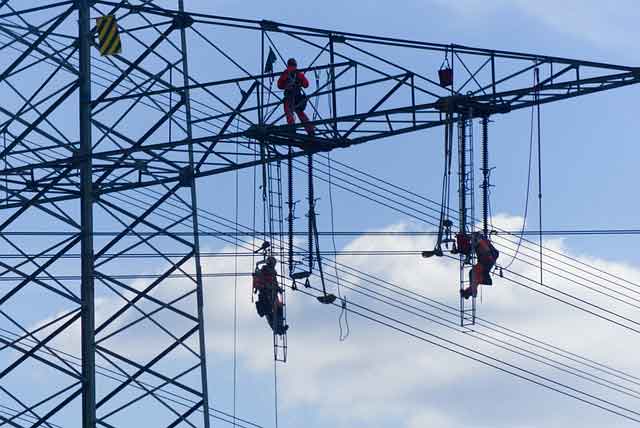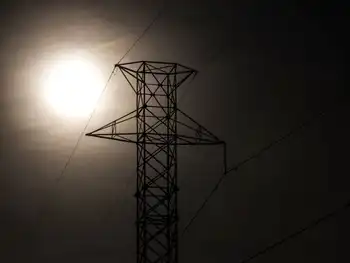Hydro-Quebec a slow learner on native rights
By Globe and Mail
Arc Flash Training CSA Z462 - Electrical Safety Essentials
Our customized live online or in‑person group training can be delivered to your staff at your location.

- Live Online
- 6 hours Instructor-led
- Group Training Available
That was in 1990. U.S. environmentalists took up their cause and, in 1992, the New York Power Authority cancelled a proposed purchase contract with Hydro-Québec, hammering the first nail in the coffin of the planned Great Whale hydro complex that ultimately went six feet under in 1994.
Since then, Quebec has boasted to have made such gargantuan strides in its relations with aboriginals that there was no longer supposed to be any need for natives to resort to embarrassing the province abroad in order to be heard at home.
But the meeting of New York Governor David Paterson and his officials with Georges-Ernest Grégoire, the chief of the Uashaunnuat of Quebec's North Shore, shows that Quebec - and governments across Canada - are still slow to catch on to new realities of resource development.
The Uashaunnuat, a group of about 4,000 Innu living on two reserves near Sept-Îles, Que., are opposed to Hydro-Québec's $8-billion, 1,550-megawatt Romaine River hydro project. The utility is chomping at the bit to break ground after getting conditional approval from a joint federal-provincial environmental panel.
The Uashaunnuat vow it will never happen. As with the Cree, it would be wrong to underestimate them. After lobbying Mr. Paterson, they've now set their sights on his counterparts in New England, covering the markets Premier Jean Charest hopes to do business with in his quest to turn Quebec into "the Alberta of electricity."
"The Chief told Governor Paterson not to buy Quebec's electricity because Hydro-Québec does not respect the ancestral rights and titles of the Innu," explains Uashaunnuat principal adviser Rosario Pinette. "We are opposed to the Romaine project without our consent. The government has said it does not need our consent but that it will consult with us. That's not enough."
Hydro-Québec has reached final agreements or agreements in principle with the four other Innu communities on the North Shore under which they would agree not to oppose the Romaine project. The Nutashkuan First Nation, for instance, signed a deal with Hydro-Québec that pays it $43-million between now and 2070. The deal also comes with the promise of training and an undetermined number of construction jobs.
The Uashaunnuat - who, like other Innu, have never signed a land claims treaty - aren't interested in bargaining with Hydro-Québec for the respect of their territorial rights. Despite the allure of upfront cash - which can be mighty strong when 70 per cent of your members live on social assistance - they maintain they'd be ceding a vital principle.
"It won't address the fundamental question," Mr. Pinette insists. "The offers from Hydro-Québec are always the same. They don't reflect the reality that we are the owners of the territory."
The conflict between Quebec and the Uashaunnuat reflects one of the dozens of lost opportunities unfolding across Canada as governments continue to impose their way of resource development on the natives whose lives are most affected by it. Instead of treating aboriginals as potential partners - with a voice, and even an equity stake in resource projects - governments still see them as problems to be managed.
Mr. Charest is as guilty as any politician in this respect. He recently spent untold dollars on slick videos and campaign material to tout his Plan North, his attempt to channel Robert Bourassa and become the latest Quebec premier to mine the political gold in untapped resources above the 50th parallel. What he didn't bother to do is ask the First Nations and Inuit if the idea of opening up their territory to more development is okay with them. Has he learned nothing?
In 2004, the Supreme Court of Canada established that governments have a "duty to consult and accommodate" aboriginals when either they or a third party - such as a mining company - is contemplating any activity that might adversely impact native territory.
The watershed ruling has changed the resource development game in Canada, but it does not give aboriginals veto power over projects. Too many governments, including Quebec, think that gives them the ultimate authority to impose decisions on native communities. Doing so may eliminate one problem in the short term. But it only threatens to create bigger ones down the road, as overflowing reserves slide deeper into poverty and disengagement, and rob potentially win-win projects of their legitimacy in the eyes of Canadians - and New Yorkers.
The Uashaunnuat may not be able to pull off a publicity stunt that captures the imagination of New Yorkers the way the Cree did almost 20 years ago. But they shouldn't have to, either; we were supposed to have moved beyond that. Quebec and its monolithic utility have proved we haven't.











